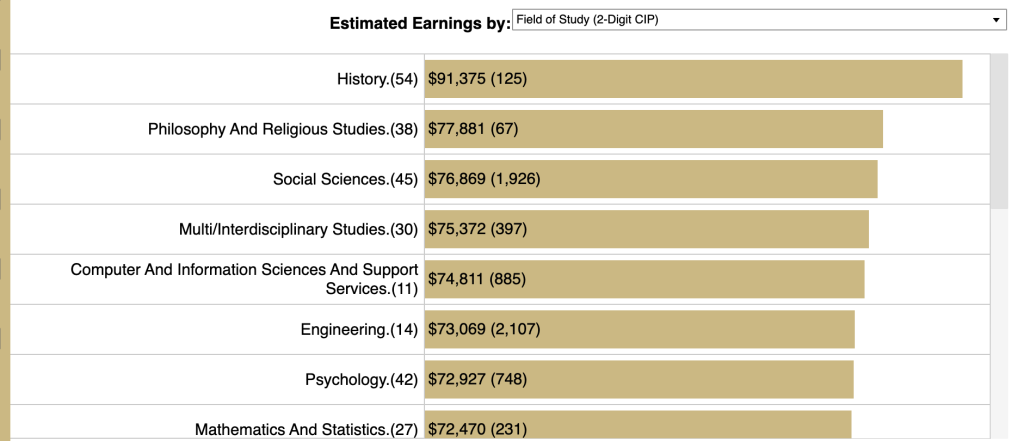
Students and faculty in Religious Studies face a frequent question, “What can you do with a Religious Studies major?” (Colleagues in other cognate fields hear similar queries.) We often respond that students/graduates can do a wide range of things with their degree. An easy way to demonstrate that is to draw examples from our alumni, as they have pursued careers as diverse as medicine, law, education, business, and non-profit management, to name a few. Fielding such questions made many of us excited to see the chart of Colorado University System alumni earnings on social media recently. The most lucrative majors were not Engineering and Finance but History and Philosophy/Religious Studies.
While surprising, it makes sense on one level. Our students gain skills in writing/communication, critical thinking, and analyzing social dynamics, skills that prepare them to be successful in many ways. But if we put those critical thinking skills into practice, and not simply repost this based on our own confirmation bias, then the data and our analysis quickly become more complicated.
While the chart does not show the details, particular limits/parameters have to be selected to get this chart. (You can play with the data from Colorado University by selecting the tab “Earnings (Degree and Field)” tab). For starters, the data shown involves those with a Bachelor’s degree only. Anyone with a graduate degree (beyond a bachelors) is not counted here, so it is not History or Philosophy/Religious Studies majors who became lawyers, as one might presume. The data is also adjusted for age, so a person a year or two out of college are probably not earning the salaries listed.
More significantly, the chart changes if you choose a different categorization of fields. CIP codes are six-digit numbers that designate a particular instructional programs, but you can arrange things by 2-digit CIP codes (which combines Philosophy and Religious Studies, for example, and counts all Social Sciences as one field) or as more specific groups (based on the six-digit code. The chart above uses that two-digit number, but if you choose the six-digit option, History drops below Information Systems, International Studies, and Electrical Engineering. Philosophy is 8th on the list, while Religious Studies disappears because the number of data points is too small.
The disappearance of Religious Studies relates to a few other parameters. In addition to restricting data to recent graduates (2011-2021), the limiter “Employed in the field” was selected for the chart above. If you switch to “Employed out of the field,” the whole chart turns around. Religious Studies has a sufficient number of data points and leaps above History and Philosophy. Religious Studies is in the mid-thirties in the ranking, while History is about twenty-five spots lower than Religious Studies, right below Accounting but above Finance and Economics. At the bottom of the list is Business Administration. The relative positions, thus, still do not conform to conventional wisdom, at least for those working outside their field with a four-year degree.
All of this investigation (thanks to the assistance of colleagues on social media) generates a much more complicated view. One way to make sense of this is to acknowledge that a person’s major does not guarantee a particular earning potential. So much depends on what the alumnus does with their skills, knowledge, and degree after graduation. A student who can articulate the skills that they developed in their program(s) and relate those to a broader set of careers has greater potential for earnings and a satisfactory career (and, of course, the two do not always go together). The implication that Religious Studies graduates are more successful when employed out of their field illustrates the importance of the range of skills that students generally develop in Religious Studies programs. You can do anything with a Religious Studies degree, but more importantly, you can also develop skills to critique the simplistic narrative of the original chart, even though we wish that it was true.